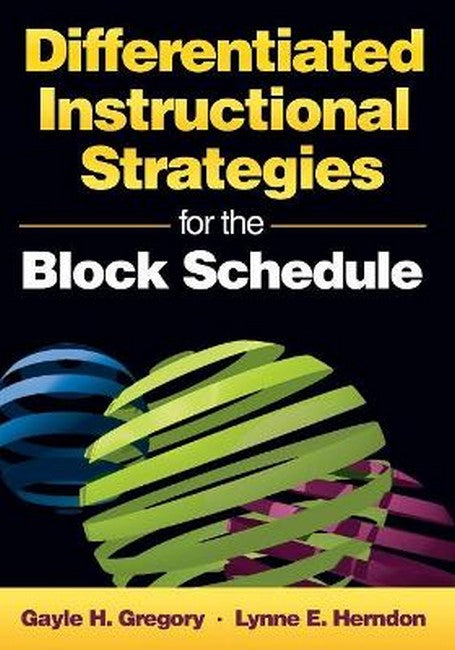Gayle H. Gregory is first and foremost a teacher, having experienced teaching and learning in elementary, middle, and secondary schools, community colleges, and universities. She has had extensive district-wide experience as a curriculum consultant and staff development coordinator. Gayle was principal/course director at York University for the Faculty of Education, teaching in the teacher education program. Her areas of expertise include brain-compatible learning, differentiated instructional and assessment strategies, block scheduling, emotional intelligence, student motivation, RTI Tier One, collaborative learning, common core, renewal of secondary schools, enhancing teacher quality, coaching and mentoring, managing change, and building professional learning communities. She also a trainer for Visible Learning Plus with Corwin. She is an author of numerous books related to educational neuroscience and differentiated instruction, assessment, and curriculum, including the following titles: * Data Driven Differentiation in the Standards-Based Classroom, Second Edition (2014, with Lin Kuzmich) * Differentiated Instructional Strategies: One Size Doesn't Fit All, Third Edition (2013, with Carolyn Chapman) * Differentiated Instructional Strategies Professional Learning Guide: One Size Doesn't Fit All, Third Edition (2013) * Differentiated Literacy Strategies for English Language Learners, Grades K-6 and Differentiated Literacy Strategies for English Language Learners, Grades 7-12 (2011, with Amy Burkman) * Differentiated Instructional Strategies for the Block Schedule (2010, with Lynne E. Herndon) * Student Teams That Get Results: Teaching Tools for the Differentiated Classroom (2009, with Lin Kuzmich) * Teacher Teams That Get Results: 61 Strategies for Sustaining and Renewing Professional Learning Communities (2009, with Lin Kuzmich) * Differentiated Instructional Strategies for Science, Grades K-8 (2009, with Elizabeth Hammerman) * Differentiating Instruction With Style: Aligning Teacher and Learner Intelligences for Maximum Achievement (2005) * The Activities for Differentiated Classroom series (2007, with Carolyn Chapman) She is affiliated with organizations such as ASCD and Learning Forward. Her ASCD publication is The Motivated Brain: Improving Student Attention engagement and Perseverance (2015, with Martha Kaufeldt). Gayle consults internationally with teachers, administrators, and staff developers. She and her family of two daughters and two granddaughters all reside in Burlington, Ontario. Gayle is committed to lifelong learning and professional growth for herself and others. She may be contacted at gregorygayle@netscape.net, www.gaylehgregory.com, and @gaylegregory6. Lynne Herndon has over twenty years experience teaching science at the middle, high school and college level, five of which have been in a block schedule. She has conducted workshops at the local, state, and national levels in the areas of classroom management, curriculum mapping, differentiated instruction, integrating technology and teaching in a block schedule. She also has experience working in staff development, curriculum design and school improvement planning. Lynne's educational background includes a Bachelor's Degree in General Science from Buena Vista University and a Masters Degree in Science Education from the University of Northern Iowa. Lynne is dedicated to providing research-based growth opportunities that have practical applications for classroom teachers. Lynne's written works includes Differentiated Instruction in a Block Schedule written with co-author Gayle Gregory, Thinking Inside the Block Schedule written with co-authors, Pam Robbins and Gayle Gregory, Thinking Inside the Block: The Teacher's Day Planner, written with co-author Pam Robbins, both published by Corwin Press (1998). Lynne may be contacted at 702-269-4872 or by E-mail at lynne.herndon@herndons-net.com.
Request Academic Copy
Please copy the ISBN for submitting review copy form
Description
Acknowledgments About the Authors 1. Introduction 2. Who Are the Learners? 3. Planning for Instruction 4. Classroom Management 5. Brain-Based Learning 6. Lesson Plans in Action 7. Evidence-Based Best Practices 8. Cooperative Learning 9. Assessing Student Learning 10. Using Assessment to Adjust, Compact, and Group 11. Technology Integration 12. Final Thoughts References Index
"This is an incredible resource for teachers who are looking for ways to use best practices in planning for differentiation. The highly readable text is packed with user-friendly strategies for incorporating formative and summative assessments, brain-based learning, learning styles, backwards design lesson planning, and more. I will pick this book up again and again!" -- Jodi Mulholland, Principal "The checklist for reviewing and analyzing curriculum maps is powerful, giving teachers guidance with differentiating instruction while teaching on the block." -- Delphia Young, Coordinator of Special Projects

